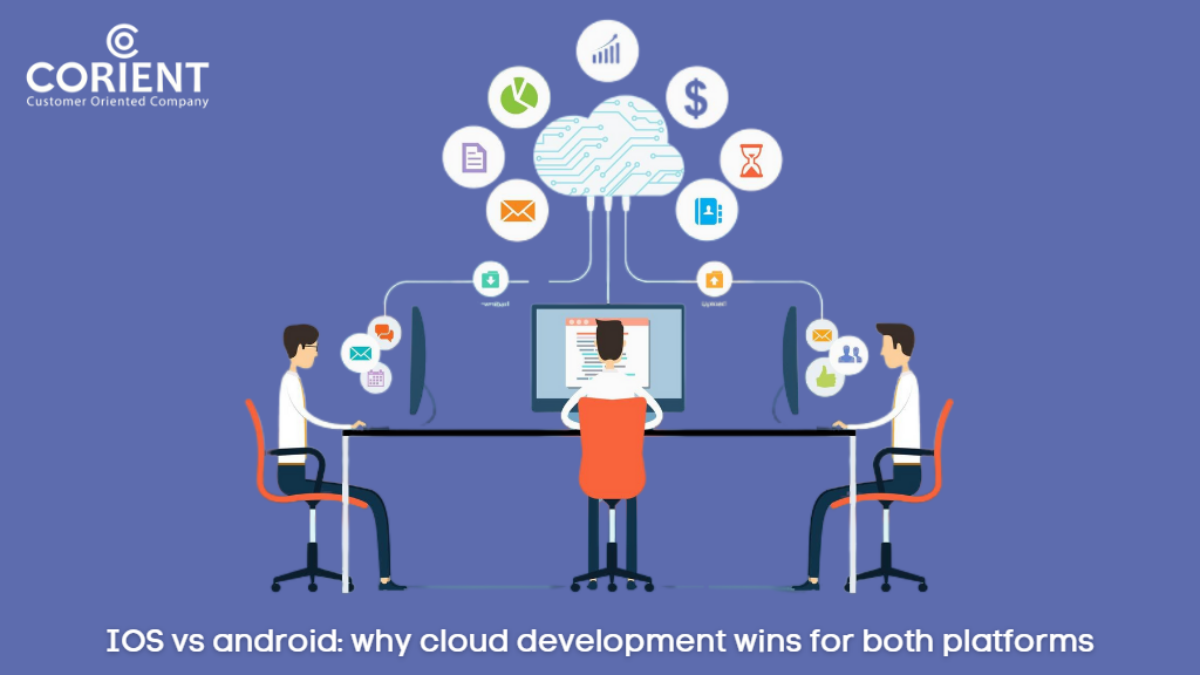In the digital age, businesses with various backgrounds increasingly depend on mobile apps to expand their business and provide good customer service. Due to its usefulness, the demand for mobile applications is bound to expand further in the coming years. If you want to develop and incorporate mobile applications into your business, then you should be aware that most applications work on Android and iOS operating systems.
Both Android and iOS operating systems are used in mobile devices such as smartphones and tablets, and both are equally useful, this makes choosing a very difficult task. Furthermore, cloud computing has brought scalability and versatility to apps, making Android and iOS equal.
In this blog, we will consider the risk of selecting one platform over the other for app development and the importance of cloud development in applications. Let’s get started.
Difference between Developing Apps for iOS and Android
There are some key differences while creating iOS and Android operating systems apps, which we will mention below.
Programming Languages
One major difference between apps developed for iOS and Android is the programming language. For iOS apps, the programming language used is Swift or Objective- C. The use of Swift makes iOS apps simpler to develop compared to Android apps.
On the other hand, Android developers use Kotlin or Java. Java is quite trustworthy, so it is used widely in app creation. Java is also quite widely preferred because of its security and stability. The Java Virtual Machine is needed to run the programming language Kotlin. Upgrading Java also resolves many limitations.
Design Differences
The main feature of an iOS design app is simplicity in shape, colour, and navigation. On the other hand, Android apps have a more adjustable interface, and their designs have more lively colours and animations.
Complexity in Development
Creating Android apps is more complex than creating iOS apps. The reason behind this is device fragmentation. Fragmentation means the greater range of screen sizes, resolutions, and hardware specifications in the Android ecosystem. Android is open source, thus allowing iOS apps to be installed on devices without any restrictions. On the other hand, iOS is strictly regulated by the Apple ecosystem, thus being less fragmented.
Tools for Software Development
To develop an app, you will require tools such as a debugger, source code editor, and project management. These tools come in a software package called an integrated development environment. For Android, the official IDE is Android Studio, which contains the tools, APIs, and libraries needed to develop apps. Android Studio uses Gradle Build System, debugger, and source code editor, thus giving you a strong solution for automating Android app builds.
On the other hand, XCode IDE is the IDE for iOS, and its main feature is an interface builder. The interface builder lets designers create user interfaces visually. Additionally, it helps make the user interface more compliant with Apple’s Human Interface Guidelines. To cut a long story short, we can say that Android Studio and XCode have similar features and advantages.
Development Cost
One final aspect that can differentiate between the development of iOS and Android apps is cost. However, several factors influence cost, and it is difficult to say which one is more expensive. For instance, device fragmentation and complexity in development will certainly increase costs.
To make it simple for you, Android apps are usually more expensive because of the time taken to develop them. However, it is safe to say that the costs of iOS and Android apps will have to be taken into consideration on an individual basis.
Cloud Development the Uniting Factor
Thanks to cloud development, creating apps for iOS and Android operating systems is changing rapidly. By using the cloud’s capabilities in app development, you can make apps compatible across platforms. If you are interested in making apps for iOS and Android, then you must either recruit developers directly or hire Android developers or iOS developers from service providers such as Corient.
Advantages of Cloud-Enabled App Development
Cloud development in apps has brought in certain advantages that are as follows:
Increased Security
Cloud service providers will use encryption to provide the best virtual security possible. Most businesses are unable to achieve such security alone.
Cost Effective
When you switch to cloud-based apps, you will require large servers and room to store them, which is a one-time investment and long-term benefit. You are also paying only for the usage and when you use it, thus making budgeting easy. Additionally, you are reducing the consumption of electricity, which makes it environment friendly.
Easy to Adapt and Expand
If your business is expanding rapidly, the cloud app will adjust and expand accordingly. Cloud apps use processing power, so quick adjustments can be made, and your
customers can enjoy a seamless experience.
Promotes Remote Working
Using cloud apps, you can work while travelling, from home, or at a coffee shop. These apps are compatible with all your devices.
Speed
These apps are pretty fast and responsive because they store the most frequently used data close at hand, thus reducing time consumption and increasing productivity.
Works Offline
These apps can work offline on your smartphone, which is valuable when the internet is down or when you are out of Wi-Fi range. When your internet is restored or when you are back in Wi-Fi range, these apps automatically sync your work to the cloud from where you saved it on your smartphone.
Compatibility with Multiple Devices
No matter where you log in, from your smartphone or office desktop, the cloud app will not create any problems. Because it is compatible with most devices, you do not waste your time making adjustments.
Conclusion
To conclude, iOS and Android apps are here to stay for the foreseeable future. Furthermore, cloud development has made them more relevant by making these apps compatible with both operating systems. Cross-platform development tools have cut down expenses and optimised resources, leading to an increase in developer
productivity. To answer whether Android or iOS apps are the best, we will say that the one that fulfils your individual requirements is the best for you. We hope this blog will encourage you to recruit app developers to streamline your business operation. If you are finding it difficult to recruit developers directly, then try out the option of hiring the services of Android or iOS developers from service providers such as Corient.

